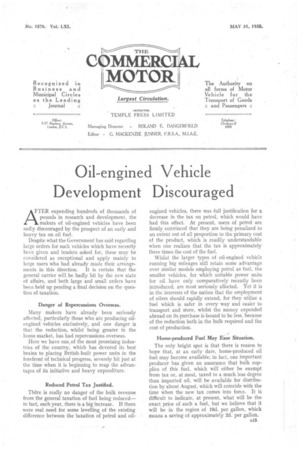Oil-engined Vehicle Development Discouraged
Page 33

If you've noticed an error in this article please click here to report it so we can fix it.
AFTER expending hundreds of thousands of pounds in research and development, the makers of oil-engined vehicles have been sadly discouraged by the prospect of an early and heavy tax on oil fuel.
Despite what the Government has said regarding large orders for such vehicles which have recently been given and tenders asked for, these may be considered as exceptional and apply mainly to large users who had already made their arrange ments in this direction. It is certain that the general carrier will be badly hit by the new state of affairs, and both large and small orders have been held up pending a final decision on the question of taxation.
Danger of Repercussions Overseas.
Many makers have already been seriously affected, particularly those who are producing oilengined vehicles exclusively, and one danger is that the reduction, whilst being greater in the home market, has had repercussions overseas.
Here we have orie_of the most promising industries of the country, which has devoted its best brains to placing British-built power units in the forefront of technical progress, severely hit just at the time when it is beginning to reap the advantages of its initiative and heavy expenditure.
Reduced Petrol Tax Justified.
Th&e is really no danger of the bulk revenue from the general taxation of fuel being reduced— in fact, each year, there is a big increase. If there were real need for some levelling of the existing difference between the -taxation of petrol and oil engined vehicles, there was full justification for a decrease in the tax on petrol, which would have had this effect. At present, users of petrol are firmly convinced that they are being penalized to an extent out of all proportion to the primary cost of the product, which is readily understandable when one realizes that the tax is approximately three times the cost of the fuel.
Whilst the larger types of oil-engined vehicle running big mileages still retain some advantage over similar models employing petrol as fuel, the smaller vehicles, for which suitable power units for oil have only comparatively recently been introduced, are most seriously affected. Yet it is in the interests of the nation that the employment of oilers should rapidly extend, for they utilize a fuel which is safer in every way and easier to . transport and store, whilst the money expended abroad on its purchase is bound to be less, because of the reduction both in the bulk required and the cost of production.
Home-produced Fuel May Ease Situation.
The only bright spot is that there is reason to hope that, at an early date, home-produced oil -fuel may become available; in fact, one important producer has given an assurance that bulk supplies of this fuel, which will either be exempt from tax or, at most, taxed to a much less degree than imported oil, will be available for distribution by about August, which will coincide with the time when the new tax comes into force. It is difficult to indicate, at present, what will be the exact price of such a fuel, but we believe that it will be in the region of 10d. per gallon, which means a saving.of approximately 2d. per gallon.




































































































